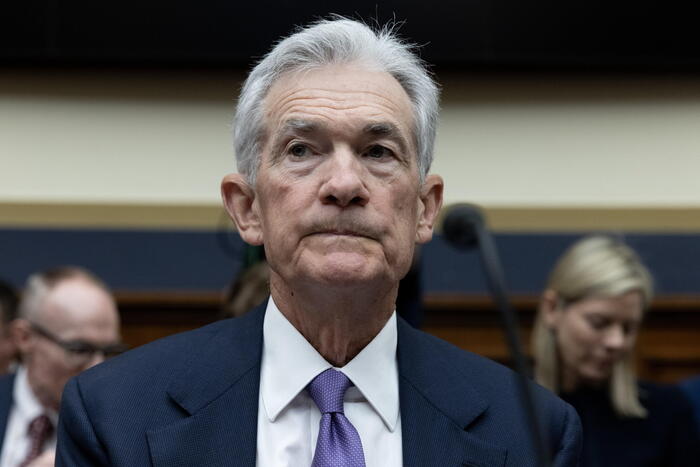The world will recover from the economic shock of the pandemic more slowly than expected. Among other things, because it has not been able to get out of the loop of waves of infections since in January 2020 a mysterious pneumonia claimed the first death in the Chinese city of Wuhan. The omicron variant, which has shaken Europe with particular force, will cool the rebound announced by the International Monetary Fund (IMF) on a global scale by half a point, which will be 4.4% in 2022 and 3.8% in 2023. According to the institution led by Kristalina Georgieva, the takeoff in this first quarter continues to be jeopardized by the restrictions imposed by governments, job losses and the impact of the new wave of infections on sectors such as tourism and restaurants. The document also places special emphasis on inflationary tensions,which he believes will "persist longer than anticipated," with "continuing supply chain disruptions and high energy prices," particularly in the United States.
Georgieva made a very graphic statement last Friday at the World Economic Forum that global markets face a "hurdle race."
In its January
World Economic Outlook
report
,
the IMF puts almost all of these dangers black on white.
The largest of them is still the coronavirus, which he considers can only be tamed if vaccination rates are raised in developing countries and access to effective therapies is generalized.
"The world economy enters 2022 in a weaker position than expected," the document presented on Tuesday clearly starts.
The report points out that the world, in general, carries difficulties from previous years and brings new ones. Among the latter are the new geopolitical risks. The IMF cites those of Eastern Europe, referring to the conflict in Ukraine, with consequences on the energy market and which, from the outset, has brought enormous volatility to the financial markets. However, the institution points out that there will continue to be disruptions in the global supply chain, among other things due to the "zero tolerance" policy for covid by the Chinese authorities and distribution problems, which will continue to keep a part of the demand. All that cocktail will cause the inflation rate to settle in the economy, especially the North American one, longer than expected.
The IMF estimates that the price rise will be 3.9% in advanced economies and 5.9% in emerging markets and developing countries.
Inflation will moderate to fall in 2023, as long as the virulence of the coronavirus eases, supply chains oil up, demand balances out and central banks tighten their monetary policy to put prices at bay.
Again, there are plenty of risks that can make inflation a serious problem.
The institution looks to the United States.
There, he says, "the story is different: a sharp drop in unemployment has been accompanied by buoyant wage growth."
“In addition, workers who left in-person service professions (for example, leisure and hospitality) during the pandemic may not be willing to return,”
add the document.
That lack of labor in various industries, the document concludes, can make inflation fly.
Spain, at the head of the advanced countries in 2023
Faced with this new panorama, the IMF sticks a cut to its forecasts for this year.
This cut will be especially strong in the United States, whose GDP will grow 4% (1.2 points less) and Germany, which will advance 3.8% (0.8 points less).
Both countries will pay above all for breaks in supply chains.
China's growth will be 4.8%, also eight tenths lower than forecast in October, while only Japan, with an anemic recovery, improves its outlook for 2022 by just one tenth.
Spain is no stranger to the global trend.
The institution chaired by Kristalina Georgieva confirms the reduction in growth prospects for this year, down to 5.8%, which was already announced last December, when it presented the report known as Article IV on the Spanish economy.
Then,
The rise in prices has meant that the central banks have already begun to move, although at different dimensions and speeds.
Analysts expect the Federal Reserve this week to launch a clear message about the withdrawal of stimulus and the next rate hikes, which could be between 0.75% and 1% by the end of the year.
The European Central Bank, on the other hand, will relax its debt purchases, but for now it will keep rates low until 2023.
The IMF proposes a wide range of recommendations on how to act in the face of the risks that lie ahead.
The institution begins with what it judges to be the heart of the problem: "put an end to persistent disparities" in access to the tools to combat covid-19, that is, vaccines, tests, treatments and protective equipment.
And that unequal distribution remains entrenched: while the vaccination rate is close to 70% in high-income countries, it is below 4% in developing economies.
At the economic level, the IMF asks the central banks to monitor with the utmost attention the indicators linked to the rise in prices, such as inflation expectations, wage growth and unit labor costs.
What's more,
Tighter monetary policy may lead countries to face tighter financing conditions.
For this reason, the IMF warns that governments will have to reduce their deficits in the coming years, always accompanying them on the path of recovery.
Although, in view of the blow dealt by each variant, he adds: "If the pandemic worsens, consolidation can be slowed down where fiscal space allows it."

/cloudfront-eu-central-1.images.arcpublishing.com/prisa/OYBIKOIZGRWA6ZDW5O45WNU2KI.jpg)
/cloudfront-eu-central-1.images.arcpublishing.com/prisa/3FI7KHR4GI7ABUOQDZ3ENWASZQ.jpg)










